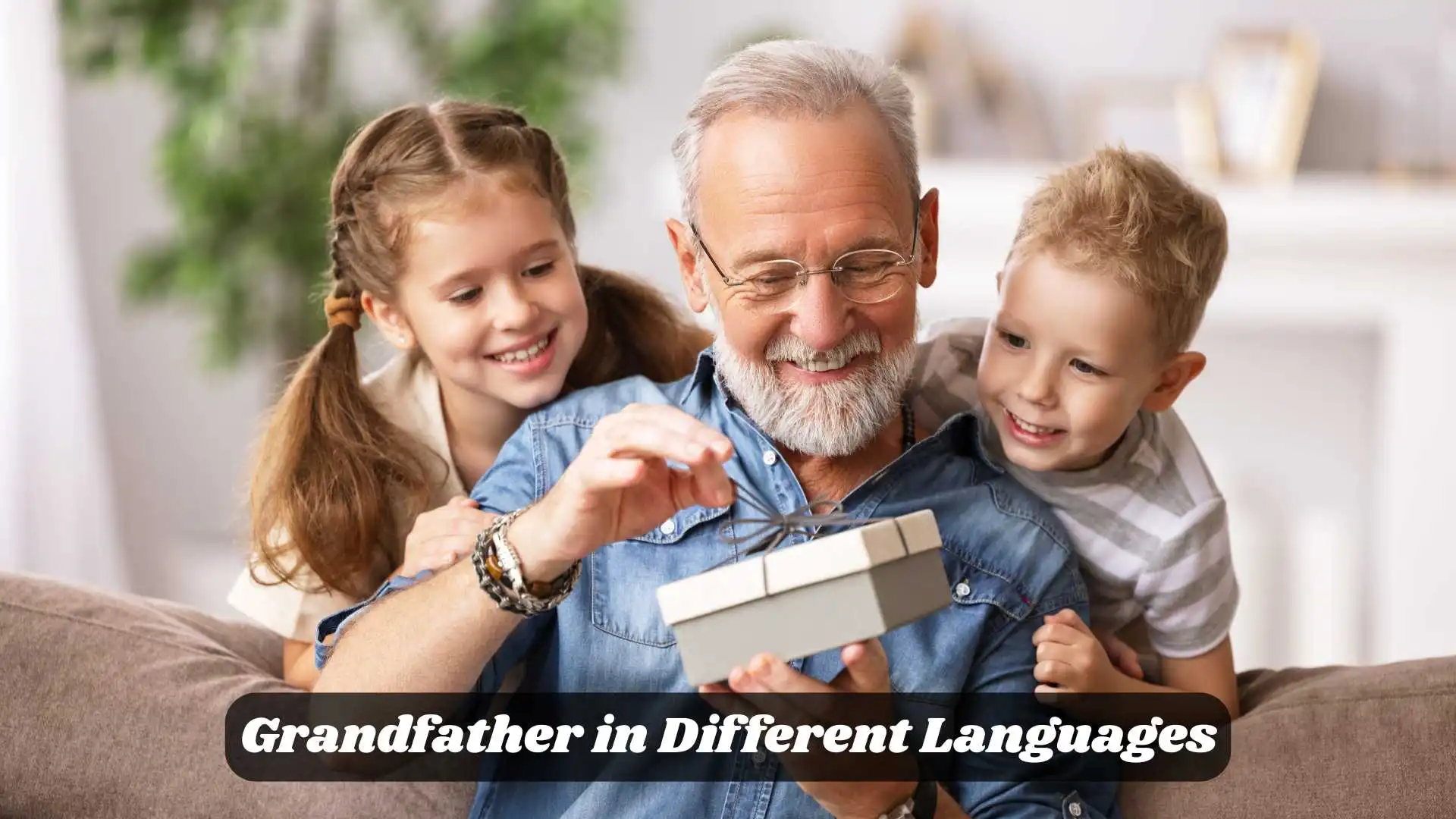Have you ever wondered how people around the world say “Grandfather”?
It’s more than just a word — it’s a symbol of love, wisdom, and the bond that connects generations.
In this article, we’ll explore Grandfather in Different Languages, uncovering how this cherished title is spoken across the globe and what it means in different cultures.
This guide is written just for you — the curious mind who loves learning about languages, traditions, and the stories they tell.
As you go through each translation, you’ll discover not only how to say “Grandfather” in 70 languages but also the warmth, respect, and affection that every culture holds for this special figure.
By the end, you’ll feel more connected to families worldwide — through one beautiful word shared in many voices.
🌍 How to Say Grandfather in 70 Different Languages
- English (🇬🇧) – Grandfather | Pronunciation: GRAND-fah-thur
Example: My grandfather tells the best stories. - Spanish (🇪🇸) – Abuelo | Pronunciation: ah-BWEH-loh
Example: Mi abuelo me enseñó muchas cosas. (My grandfather taught me many things.) - French (🇫🇷) – Grand-père | Pronunciation: gron-PEHR
Example: Mon grand-père adore le jardinage. (My grandfather loves gardening.) - German (🇩🇪) – Großvater | Pronunciation: GROSS-fah-ter
Example: Mein Großvater liest jeden Morgen die Zeitung. (My grandfather reads the newspaper every morning.) - Italian (🇮🇹) – Nonno | Pronunciation: NON-no
Example: Mio nonno è molto saggio. (My grandfather is very wise.) - Portuguese (🇵🇹) – Avô | Pronunciation: ah-VOH
Example: O meu avô gosta de contar histórias. (My grandfather likes to tell stories.) - Russian (🇷🇺) – Дедушка (Dedushka) | Pronunciation: DYEH-doosh-kah
Example: Мой дедушка живёт в деревне. (My grandfather lives in the village.) - Chinese (Mandarin) (🇨🇳) – 爷爷 (Yéye) | Pronunciation: yeh-yeh
Example: 我的爷爷很亲切。 (My grandfather is very kind.) - Japanese (🇯🇵) – おじいさん (Ojīsan) | Pronunciation: oh-JEE-sahn
Example: おじいさんは毎日散歩します。 (My grandfather takes a walk every day.) - Korean (🇰🇷) – 할아버지 (Harabeoji) | Pronunciation: ha-rah-buh-jee
Example: 할아버지는 이야기를 잘하세요. (My grandfather tells great stories.) - Arabic (🇸🇦) – جد (Jadd) | Pronunciation: jad
Example: جدي يحب الزراعة. (My grandfather loves farming.) - Hindi (🇮🇳) – दादा (Dādā) | Pronunciation: dah-dah
Example: मेरे दादा बहुत समझदार हैं। (My grandfather is very wise.) - Urdu (🇵🇰) – دادا (Dada) | Pronunciation: dah-dah
Example: میرے دادا بہت محبت کرنے والے ہیں۔ (My grandfather is very loving.) - Turkish (🇹🇷) – Dede | Pronunciation: deh-deh
Example: Dedem bana masallar anlatırdı. (My grandfather used to tell me stories.) - Greek (🇬🇷) – Παππούς (Pappoús) | Pronunciation: pah-POOS
Example: Ο παππούς μου μαγειρεύει νόστιμα φαγητά. (My grandfather cooks delicious food.) - Hebrew (🇮🇱) – סבא (Saba) | Pronunciation: SAH-bah
Example: סבא שלי גר ליד הים. (My grandfather lives near the sea.) - Thai (🇹🇭) – ปู่ (Puu) | Pronunciation: poo
Example: ปู่ของฉันชอบเล่าเรื่องเก่า ๆ. (My grandfather loves telling old stories.) - Vietnamese (🇻🇳) – Ông | Pronunciation: ohng
Example: Ông tôi rất hiền lành. (My grandfather is very gentle.) - Swahili (🇰🇪) – Babu | Pronunciation: BAH-boo
Example: Babu yangu ana hekima nyingi. (My grandfather has great wisdom.) - Zulu (🇿🇦) – Umkhulu | Pronunciation: oom-KHOO-loo
Example: Umkhulu wami ungumuntu ohloniphekile. (My grandfather is a respected man.) - Polish (🇵🇱) – Dziadek | Pronunciation: JYAH-dek
Example: Mój dziadek jest bardzo mądry. (My grandfather is very wise.) - Dutch (🇳🇱) – Grootvader | Pronunciation: GROHT-fah-der
Example: Mijn grootvader houdt van vissen. (My grandfather loves fishing.) - Swedish (🇸🇪) – Morfar / Farfar | Pronunciation: MOOR-far / FAR-far
Example: Min farfar bor på landet. (My grandfather lives in the countryside.) - Finnish (🇫🇮) – Isoisä | Pronunciation: ee-so-ee-sah
Example: Isoisäni on erittäin ystävällinen. (My grandfather is very kind.) - Hungarian (🇭🇺) – Nagyapa | Pronunciation: nad-yah-pah
Example: A nagyapám sok történetet mesél. (My grandfather tells many stories.) - Czech (🇨🇿) – Dědeček | Pronunciation: DYEH-deh-chek
Example: Můj dědeček miluje hudbu. (My grandfather loves music.) - Romanian (🇷🇴) – Bunic | Pronunciation: boo-NEEK
Example: Bunicul meu locuiește la țară. (My grandfather lives in the countryside.) - Ukrainian (🇺🇦) – Дідусь (Didus’) | Pronunciation: dee-DOOS
Example: Мій дідусь дуже добрий. (My grandfather is very kind.) - Persian (🇮🇷) – پدربزرگ (Pedar Bozorg) | Pronunciation: peh-dar-bo-zorg
Example: پدربزرگم داستانهای جالبی تعریف میکند. (My grandfather tells interesting stories.) - Malay (🇲🇾) – Datuk | Pronunciation: DAH-took
Example: Datuk saya sangat bijak. (My grandfather is very wise.) - Indonesian (🇮🇩) – Kakek | Pronunciation: KAH-kek
Example: Kakek saya suka berkebun. (My grandfather loves gardening.) - Filipino (🇵🇭) – Lolo | Pronunciation: LOH-loh
Example: Si Lolo ay mabait at matalino. (My grandfather is kind and smart.) - Danish (🇩🇰) – Bedstefar | Pronunciation: BEST-uh-far
Example: Min bedstefar elsker kaffe. (My grandfather loves coffee.) - Norwegian (🇳🇴) – Bestefar | Pronunciation: BES-teh-far
Example: Bestefaren min er en snill mann. (My grandfather is a kind man.) - Slovak (🇸🇰) – Starý otec | Pronunciation: STAH-ree oh-tets
Example: Môj starý otec žije v meste. (My grandfather lives in the city.) - Slovenian (🇸🇮) – Dedek | Pronunciation: DEH-dek
Example: Moj dedek rad pripoveduje zgodbe. (My grandfather likes telling stories.) - Bulgarian (🇧🇬) – Дядо (Dyado) | Pronunciation: DYA-doh
Example: Дядо ми е много мил човек. (My grandfather is a very kind person.) - Croatian (🇭🇷) – Djed | Pronunciation: DYEHD
Example: Moj djed voli prirodu. (My grandfather loves nature.) - Serbian (🇷🇸) – Деда (Deda) | Pronunciation: DEH-dah
Example: Деда ми увек прича шале. (My grandfather always tells jokes.) - Bosnian (🇧🇦) – Djed | Pronunciation: DYEHD
Example: Moj djed živi u selu. (My grandfather lives in the village.) - Estonian (🇪🇪) – Vanaisa | Pronunciation: vah-nah-ee-sah
Example: Vanaisa räägib huvitavaid lugusid. (My grandfather tells interesting stories.) - Latvian (🇱🇻) – Vecaistēvs | Pronunciation: vets-eye-stayvs
Example: Mans vecaistēvs mani daudz iemācīja. (My grandfather taught me a lot.) - Lithuanian (🇱🇹) – Senelis | Pronunciation: seh-NEH-lees
Example: Mano senelis gyvena kaime. (My grandfather lives in a village.) - Maltese (🇲🇹) – Nannu | Pronunciation: NAN-noo
Example: In-nannu tiegħi jħobb jirrakkonta stejjer. (My grandfather loves telling stories.) - Icelandic (🇮🇸) – Afi | Pronunciation: AH-fee
Example: Afi minn er mjög góður maður. (My grandfather is a very good man.) - Irish (🇮🇪) – Seanathair | Pronunciation: shan-AH-hir
Example: Tá mo sheanathair ina chónaí ar an tuath. (My grandfather lives in the countryside.) - Welsh (🏴) – Tad-cu | Pronunciation: tad-kee
Example: Mae fy nhad-cu yn ddyn caredig. (My grandfather is a kind man.) - Hawaiian (🇺🇸) – Kupuna Kāne | Pronunciation: koo-POO-nah KAH-neh
Example: He kupuna kāne aloha ia ia. (My grandfather is a loving man.) - Maori (🇳🇿) – Koroua | Pronunciation: koh-ROH-wah
Example: He tangata mohio taku koroua. (My grandfather is a wise man.) - Afrikaans (🇿🇦) – Oupa | Pronunciation: OH-pah
Example: My oupa hou van boeke lees. (My grandfather loves reading books.) - Amharic (🇪🇹) – አያት (Ayat) | Pronunciation: ah-yaht
Example: አያቴ ታላቅ ሰው ነው። (My grandfather is a great man.) - Bengali (🇧🇩) – দাদা (Dada) | Pronunciation: dah-dah
Example: আমার দাদা খুব ভালো মানুষ। (My grandfather is a very good man.) - Tamil (🇮🇳) – தாத்தா (Thaathaa) | Pronunciation: THAA-thaa
Example: என் தாத்தா கதை சொல்ல விரும்புகிறார். (My grandfather loves telling stories.) - Telugu (🇮🇳) – తాత (Thaatha) | Pronunciation: THAA-tha
Example: నా తాతకు వ్యవసాయం అంటే ఇష్టం. (My grandfather loves farming.) - Kannada (🇮🇳) – ಅಜ್ಜ (Ajja) | Pronunciation: ah-jah
Example: ನನ್ನ ಅಜ್ಜ ತುಂಬಾ ಪ್ರೀತಿಯವರು. (My grandfather is very loving.) - Malayalam (🇮🇳) – അപ്പൂപ്പൻ (Appooppan) | Pronunciation: ah-poo-pan
Example: എന്റെ അപ്പൂപ്പൻ കഥകൾ പറയാൻ ഇഷ്ടപ്പെടുന്നു. (My grandfather loves telling stories.) - Gujarati (🇮🇳) – દાદા (Dada) | Pronunciation: dah-dah
Example: મારા દાદા બહુ જ સમજદાર છે. (My grandfather is very wise.) - Marathi (🇮🇳) – आजोबा (Aajoba) | Pronunciation: aa-jo-baa
Example: माझे आजोबा रोज प्रार्थना करतात. (My grandfather prays every day.) - Punjabi (🇮🇳/🇵🇰) – ਦਾਦਾ (Dada) | Pronunciation: dah-dah
Example: ਮੇਰੇ ਦਾਦਾ ਜੀ ਬਹੁਤ ਦਿਆਲੂ ਹਨ। (My grandfather is very kind.) - Nepali (🇳🇵) – हजुरबा (Hajurba) | Pronunciation: ha-jur-baa
Example: मेरा हजुरबा मलाई धेरै माया गर्नुहुन्छ। (My grandfather loves me very much.) - Sinhala (🇱🇰) – සීයා (Seeya) | Pronunciation: see-yah
Example: මගේ සීයා කතා කියන්න කැමතියි. (My grandfather loves to talk.) - Mongolian (🇲🇳) – Өвөө (Övöö) | Pronunciation: uh-VOH
Example: Миний өвөө маш ухаантай хүн. (My grandfather is a very wise man.)
❤️ Conclusion
Every language holds a warm, loving word for “grandfather.” Whether it’s abuelo, nonno, deda, or yéye, these words reflect wisdom, strength, and unconditional love passed down through generations. No matter where you go, the word grandfather feels like home.

Oliver Grant is a passionate American author known for crafting insightful and engaging content that inspires readers worldwide. With a strong background in creative writing and a deep interest in contemporary literature, Oliver has built a reputation for delivering thought-provoking narratives that resonate with a modern audience.
Throughout his career, Oliver has consistently blended intellectual depth with relatable storytelling, making complex ideas accessible to readers from all walks of life. His writing style is both elegant and approachable, allowing him to connect meaningfully with his audience.
When he’s not writing, Oliver enjoys exploring new ideas, reading across diverse genres, and mentoring aspiring writers. His dedication to the craft and his ability to present fresh perspectives have earned him a loyal following.
Oliver Grant is the author of several acclaimed books, including “The Creative Mindset,” “Stories That Connect,” and “The Modern Writer’s Journey.” Each of these works reflects his commitment to empowering readers and fellow writers through creativity and purposeful storytelling.

